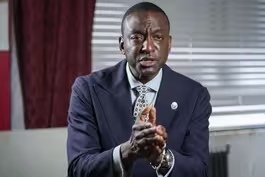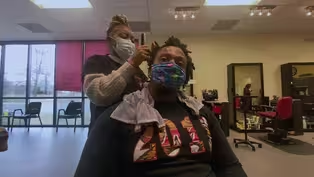
Cases of malaria transmitted in U.S. prompt concerns
Clip: 7/3/2023 | 6m 57sVideo has Closed Captions
First cases of malaria transmitted in U.S. in decades prompt concerns
For the first time in 20 years, malaria has been locally transmitted within the U.S. The Centers for Disease Control and Prevention has identified five cases, four in Florida and one in Texas. William Brangham spoke with infectious disease epidemiologist Catherine Troisi about what we know and how concerned we should be.
Problems playing video? | Closed Captioning Feedback
Problems playing video? | Closed Captioning Feedback
Major corporate funding for the PBS News Hour is provided by BDO, BNSF, Consumer Cellular, American Cruise Lines, and Raymond James. Funding for the PBS NewsHour Weekend is provided by...

Cases of malaria transmitted in U.S. prompt concerns
Clip: 7/3/2023 | 6m 57sVideo has Closed Captions
For the first time in 20 years, malaria has been locally transmitted within the U.S. The Centers for Disease Control and Prevention has identified five cases, four in Florida and one in Texas. William Brangham spoke with infectious disease epidemiologist Catherine Troisi about what we know and how concerned we should be.
Problems playing video? | Closed Captioning Feedback
How to Watch PBS News Hour
PBS News Hour is available to stream on pbs.org and the free PBS App, available on iPhone, Apple TV, Android TV, Android smartphones, Amazon Fire TV, Amazon Fire Tablet, Roku, Samsung Smart TV, and Vizio.
Providing Support for PBS.org
Learn Moreabout PBS online sponsorshipAMNA NAWAZ: For the first time in 20 years, malaria has been locally transmitted within the U.S.
The Centers for Disease Control and Prevention has identified five cases, four in Florida and one in Texas.
William Brangham spoke recently with an epidemiologist about what we know and how concerned we should be.
WILLIAM BRANGHAM: For more on these unusual cases, we turn to Catherine Troisi.
She's an infectious disease epidemiologist with UTHealth Houston School of Public Health.
Catherine, thank you so much for being here.
We have seen malaria in the past in the United States, but these cases and how they're transmitting is different.
Can you explain?
DR. CATHERINE TROISI, UTHealth Houston School of Public Health: Sure.
We always, every year, have some cases of malaria, but they are in people who acquired the malaria abroad and then came back to the United States and were visiting.
These cases are different because the people who are infected got it here in the United States.
WILLIAM BRANGHAM: And so is the hypothesis then that originally someone got sick abroad, came back, and then were bitten by a mosquito here, and that that's how it spread?
DR.CATHERINE TROISI: Yes.
And so someone who got malaria abroad was -- came back to the United States, was bitten, and then that mosquito bit somebody else, and they got infected.
WILLIAM BRANGHAM: And that is how malaria spreads.
It's not a person-to-person spread, right?
DR. CATHERINE TROISI: Correct.
There has to be a mosquito bite, although it can be spread through blood transfusions or from pregnant mother to the baby.
WILLIAM BRANGHAM: So, when people think of malaria, on some level, I think people acknowledge all of the deaths that occur every year all over the world.
How worrying is this here in the United States?
DR. CATHERINE TROISI: You know, of course, public health officials are keeping an eye on this, but we're not real worried.
It's not like COVID because it's not spread person to person.
The United States used to -- particularly in Southern states, used to have a lot of malaria.
The precursor to the CDC was actually formed to combat malaria in Southern states.
However, through the use of insecticides, through the use of better sanitation, getting rid of standing water, informing people that they should use insect repellent, we have been declared malaria-free since 1970.
So while it's disturbing to have a few locally transmitted cases, we're just not real worried about it blowing up into a COVID-like situation.
WILLIAM BRANGHAM: I mean, given that public health success -- and it is undoubtedly a success -- is there the concern then that we have sort of forgotten about malaria, and people don't know what the symptoms are like, and maybe even doctors may not know what the symptoms are and may not know it when they see it?
DR. CATHERINE TROISI: Yes, we have actually seen this with a number of infectious diseases that we have been very successful in controlling.
Doctors, parents don't know what some of these childhood infections are, and that's certainly true with malaria.
It's important, if someone is infected, to get treated quickly, for a couple of reasons.
One is for their own health.
But, also, the longer they are infected, the more likely it is the mosquito could bite them and then transmit the infection to the United States.
So, this is a good wakeup call for physicians, particularly, and other health care providers to look, to think malaria if they see someone with a high fever flu-like symptoms.
WILLIAM BRANGHAM: Those are the symptoms, principally, fever, flu-like symptoms?
DR. CATHERINE TROISI: Yes, fever, chills, flu-like symptoms.
WILLIAM BRANGHAM: I understand that this particular species of parasite, malaria parasite, isn't as bad.
Is that correct?
DR. CATHERINE TROISI: Well, in one sense, that is correct.
It does not causes severe disease as the other strains of malaria.
But, in another sense, it's worse because the parasite, the plasmodium parasite, can hide out.
And so you can have what's called relapsing fever.
So it seems like you're getting better, and then you have symptoms again.
So its important for physicians to be able to tell exactly what strain you have, so that they can give you -- you may need more medication to effectively combat it.
WILLIAM BRANGHAM: So, if someone felt some of those symptoms, but then they went away, maybe not breathe a sigh of relief and go get that checked out?
DR. CATHERINE TROISI: Right.
And those are -- those are very indescript symptoms.
So one thing you might think about is where you are in the United States.
If you are in Maine, for example, not very likely that it's malaria.
If you're in Florida, Texas, you know those Gulf states, where it's very warm, particularly right now, then maybe you might be a little bit more concerned.
It also has to do -- to get malaria, you have to be bit by a mosquito.
And so people who are outside a lot of the time are particularly at risk.
If you spend most of your time inside an air conditioning, it's not so likely.
WILLIAM BRANGHAM: One of the things that we know that increases the spread of mosquitoes and mosquitoes biting us is warmer temperatures.
We know it's incredibly warm in the American South right now, but we also know that climate change is warming up our atmosphere and warming up the planet as well.
Is it -- is it inevitable that malaria will eventually come back to the United States, or not?
DR. CATHERINE TROISI: Well, you are correct that climate change affects the distribution of the mosquito that's responsible for spreading malaria.
Also, when temperatures are higher, those mosquitoes feed more often, so people are more likely to get bit, and the parasite itself replicates faster inside the mosquito.
Also, climate warming contributes to increased storms, so there may be more standing water, where mosquitoes can breed.
However, again, in the United States, because we have -- most people have screens on their windows, on their doors, we know to wear insect repellent, although this is a good reminder, we don't have a lot of the deficiencies in our prevention mechanisms that would lead to wide spread of malaria.
WILLIAM BRANGHAM: All right, Catherine Troisi of UTHealth Houston, thank you so much for being here.
DR. CATHERINE TROISI: Thank you.
'Central Park Five' member on his historic city council race
Video has Closed Captions
Clip: 7/3/2023 | 6m 52s | Exonerated member of ‘Central Park Five’ on his historic city council primary win (6m 52s)
The effort to ban hairstyle discrimination nationwide
Video has Closed Captions
Clip: 7/3/2023 | 4m 38s | The effort to ban hairstyle discrimination nationwide (4m 38s)
Israel launches largest attacks on West Bank in 20 years
Video has Closed Captions
Clip: 7/3/2023 | 7m 27s | Israel military launches largest attacks on West Bank in nearly 20 years (7m 27s)
Katty Kay discusses book 'The Power Code' on women and power
Video has Closed Captions
Clip: 7/3/2023 | 6m 37s | Katty Kay discusses new book 'The Power Code' on women and power (6m 37s)
Lebanon struggles to emerge from economic crisis, corruption
Video has Closed Captions
Clip: 7/3/2023 | 9m 16s | Lebanon struggles to emerge from financial crisis and government corruption (9m 16s)
Ohio faces votes that could decide abortion access
Video has Closed Captions
Clip: 7/3/2023 | 6m 21s | Ohio faces critical votes that could decide abortion access in the state (6m 21s)
Providing Support for PBS.org
Learn Moreabout PBS online sponsorship
- News and Public Affairs

FRONTLINE is investigative journalism that questions, explains and changes our world.

- News and Public Affairs

Amanpour and Company features conversations with leaders and decision makers.












Support for PBS provided by:
Major corporate funding for the PBS News Hour is provided by BDO, BNSF, Consumer Cellular, American Cruise Lines, and Raymond James. Funding for the PBS NewsHour Weekend is provided by...





